Template for thank you letter after job interview
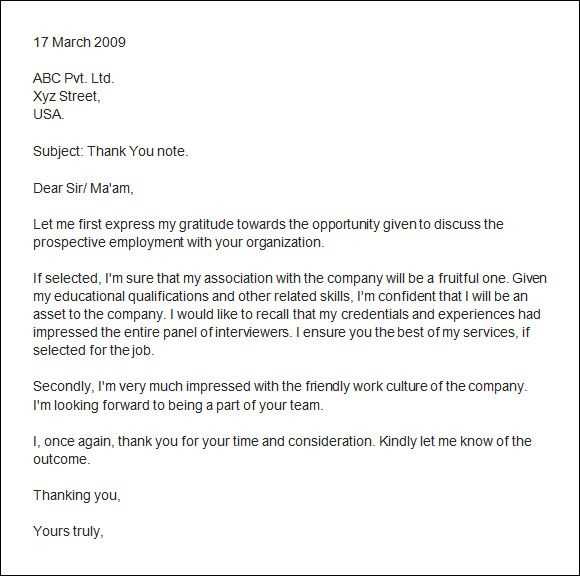
Sending a thank you letter after a job interview is a simple yet powerful way to show gratitude and reinforce your interest in the position. A well-written thank you note can leave a positive impression and differentiate you from other candidates. Keep it concise, clear, and personalized to reflect your unique experience during the interview.
Start your letter with a genuine expression of thanks. Mention specific aspects of the conversation that stood out to you and reinforce your enthusiasm for the role. This not only shows attentiveness but also strengthens your connection with the interviewer.
Next, reaffirm your skills and qualifications, linking them to the requirements of the job. Be confident in expressing how your experience aligns with what the company is looking for. This is a chance to briefly highlight why you’re a great fit without repeating your entire resume.
End the letter with a polite and professional closing. Express your eagerness for the next steps and convey that you’re available for any further questions or information. A simple sentence like “I look forward to hearing from you soon” can work well to conclude the note positively.
Template for Thank You Letter After Job Interview
Send your thank you letter within 24 hours after the interview. Personalize the message to show appreciation and reinforce your interest in the position. Here’s a basic template you can adjust to suit your needs:
Template
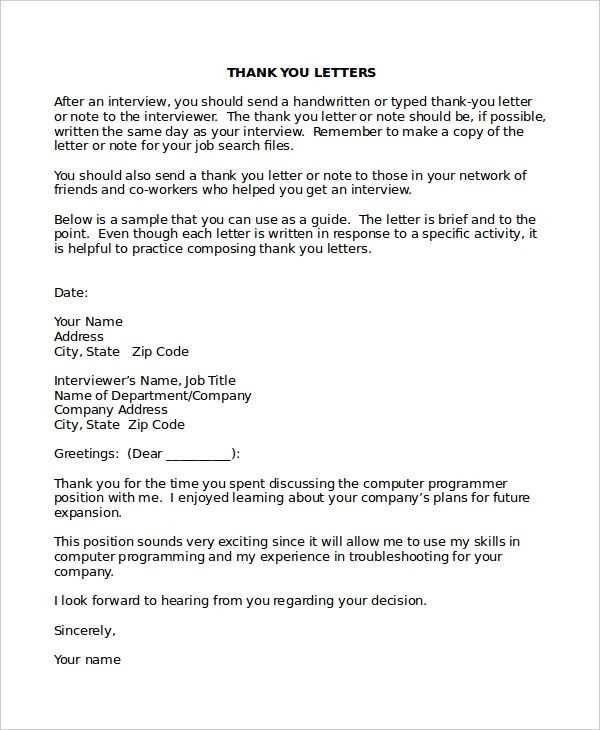
Dear [Interviewer’s Name],
Thank you for taking the time to meet with me on [interview date]. I truly appreciate the opportunity to learn more about the [company name] team and the [specific job title] role. Our conversation confirmed my enthusiasm for the position, and I am excited about the chance to contribute to [mention specific aspect of the company discussed in the interview].
It was especially inspiring to hear about [mention something discussed during the interview, such as a company initiative or project]. I am confident my experience in [mention relevant skills/experience] will enable me to make a positive impact at [company name].
Please don’t hesitate to contact me if you need any additional information. I look forward to the possibility of working together and contributing to the team’s success.
Thank you once again for your time and consideration. I look forward to hearing from you soon.
Sincerely,
[Your Name]
Key Tips for Your Letter
Keep your tone polite and professional. Be specific about what you enjoyed discussing during the interview. If you missed mentioning something important in the interview, this is a good place to briefly bring it up. Show enthusiasm without sounding desperate, and keep your letter concise and to the point.
How to Start Your Thank You Letter
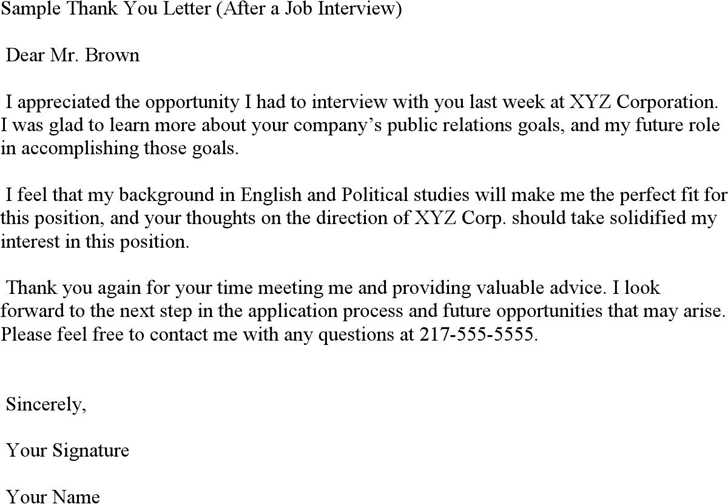
Begin with a personalized greeting. Address the recipient by name, using their preferred title (e.g., Mr., Ms., Dr.). If unsure, simply use their full name. This sets a respectful tone right from the start.
Express Gratitude Right Away
Open the letter by thanking the interviewer for their time and the opportunity to discuss the role. Be specific about the interview, mentioning details such as the position or the company, and reference something from the conversation that stood out to show genuine interest.
- Thank the interviewer for the opportunity.
- Highlight a particular part of the conversation that was insightful or enjoyable.
Be Clear and Concise
Avoid long-winded or overly formal language. Your aim is to be clear and to the point. Express enthusiasm about the position and how you feel your skills align with the role. This reinforces your interest while keeping the tone friendly and professional.
Key Points to Mention About the Interview
Begin your thank you letter by referencing specific aspects of the interview that stood out. Highlight the topics you discussed that are most relevant to the role or the company. Mentioning these details shows you were actively engaged and have a clear understanding of what was discussed.
- Shared Values or Goals: Reflect on how your personal values align with the company’s mission or the department’s objectives. This demonstrates your enthusiasm for being a part of their team.
- Key Challenges or Opportunities: If you talked about challenges the team faces or opportunities the company is exploring, express your excitement about tackling these issues. Offer insights on how your experience can add value in these areas.
- Specific Projects or Initiatives: Refer to any particular projects that were mentioned during the interview. Express your interest and discuss how your skills match what is needed to make those projects successful.
Express Gratitude for the Opportunity
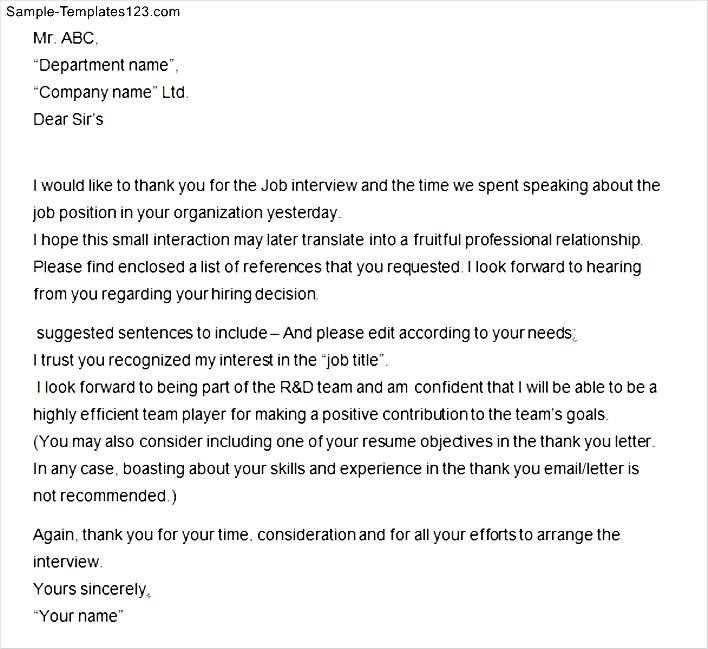
In addition to mentioning interview details, thank the interviewer for their time and consideration. Acknowledge the opportunity to learn more about the company, team, and position. This reinforces your appreciation and professionalism.
- Thank You for the Insight: Acknowledge any valuable insights shared by the interviewer, especially regarding company culture or the expectations for the role.
- Gratitude for the Opportunity: Express your gratitude for the opportunity to discuss your qualifications in detail and learn more about how you can contribute.
Reaffirm Your Interest
Conclude by reaffirming your interest in the role. Clearly state that you are excited about the potential to contribute to the team and grow within the company. Reassure them that you’re committed to the position and look forward to the next steps.
How to Express Gratitude Professionally
Begin your thank-you letter by addressing the interviewer by name. A personal touch shows you value their time. Keep the tone warm but professional. Start with a brief statement of appreciation for the opportunity to interview. Be specific about aspects of the conversation that stood out to you–this will demonstrate your genuine interest and attention to detail.
Be Specific and Personal
Point out something specific you enjoyed discussing or a topic that sparked your interest. This helps your thank-you letter stand out and reinforces your enthusiasm for the role. For example, you could mention an exciting project or initiative the company is working on that aligns with your experience and skills. A personalized approach creates a stronger connection between you and the interviewer.
Reaffirm Your Interest and Fit
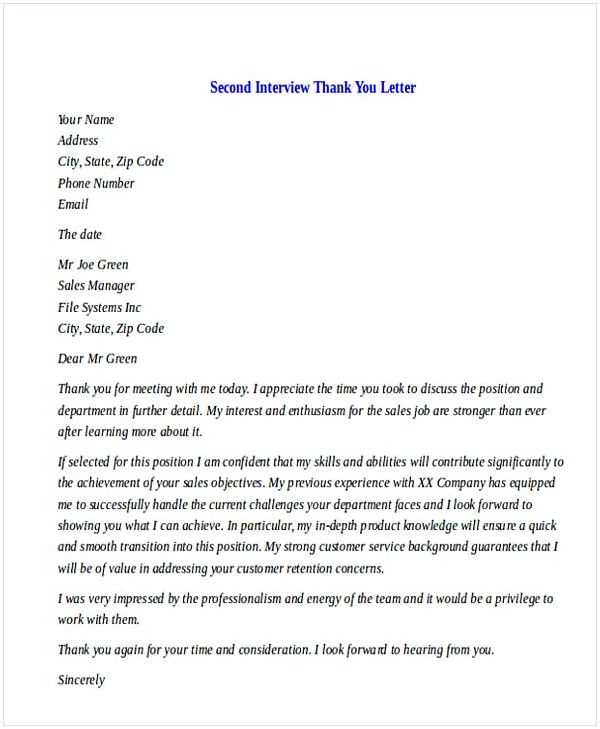
Reiterate why you’re interested in the position and how your qualifications make you a good fit for the team. Make it clear that the conversation confirmed your desire to contribute to the company’s goals. End your letter by expressing enthusiasm for the next steps and your hope to continue the conversation.
Personalizing the Message Based on the Interview Discussion
Focus on specific topics that came up during the interview to create a meaningful connection. Reference shared interests or key points that resonated with both you and the interviewer. By doing this, you not only show attention to detail but also demonstrate your enthusiasm for the role and the company culture.
Use the Interviewer’s Feedback to Your Advantage
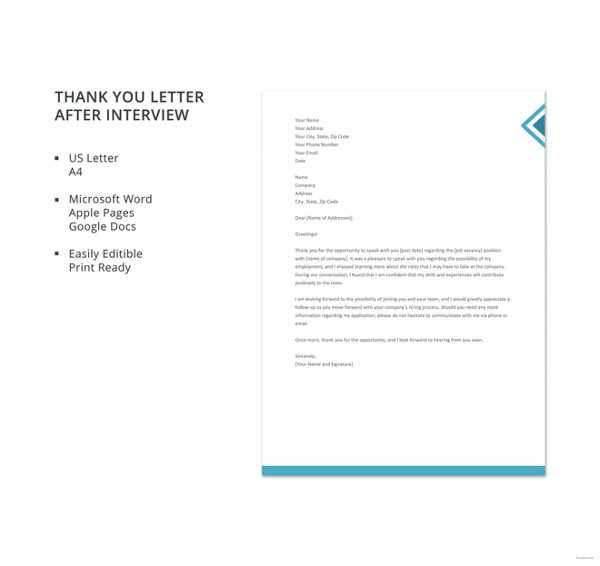
If the interviewer mentioned challenges the company is facing or specific goals they aim to achieve, acknowledge those in your message. Express your excitement about contributing to solving those challenges or helping meet those objectives. This signals that you’ve listened and are eager to be a part of the team.
Reference Your Strengths and How They Align with the Role
Personalize your thank-you letter by highlighting skills or experiences you discussed that match the company’s needs. For example, if you spoke about a project where you successfully solved a problem, briefly restate how this experience prepares you for similar tasks in the new role. This reinforces your suitability for the position.
| Topic Discussed | How to Personalize the Thank-You |
|---|---|
| Company Challenges | Express enthusiasm about tackling those challenges and share relevant experience or ideas. |
| Company Culture | Mention how your values align with the company’s culture and how you can contribute. |
| Specific Projects | Refer to how your past projects or skills directly relate to the work discussed in the interview. |
Maintaining a Positive and Polite Tone
Keep the tone upbeat and friendly throughout the thank-you letter. Address the interviewer with respect, acknowledging their time and consideration. Stay gracious and avoid sounding demanding or overly familiar. Maintain a balance between being professional and personable. A simple “Thank you for the opportunity to interview” conveys appreciation without excess formality.
Focus on expressing genuine gratitude for the chance to learn more about the company and the role. Highlight your enthusiasm without overhyping. Phrases like “I look forward to the possibility of contributing to your team” reflect your eagerness while staying polite and grounded.
Avoid being overly effusive or using exaggerated compliments. Acknowledge specific aspects of the interview that stood out, such as the company’s values or projects that align with your skills. This shows you’re attentive without sounding insincere.
Maintain clarity and conciseness in your message. Keep the letter brief, yet meaningful. Close with a polite statement like, “I look forward to hearing from you soon,” without pushing for a response too aggressively.
How to Close Your Thank You Letter
End your letter with a strong, polite closing that reinforces your enthusiasm for the role and appreciation for the interview opportunity. A simple but sincere expression of gratitude can make a lasting impression.
Restate Your Interest
Before signing off, briefly reiterate your interest in the position. A sentence like “I am excited about the opportunity to contribute to your team” signals to the interviewer that you’re still eager and committed.
Offer Availability
Let the interviewer know you’re available for any further questions or discussions. This could be as straightforward as “Please feel free to reach out if you need any more information.” It shows you are open and proactive.
Close with a professional sign-off like “Sincerely” or “Best regards,” followed by your name. This simple, respectful ending leaves a positive final note.